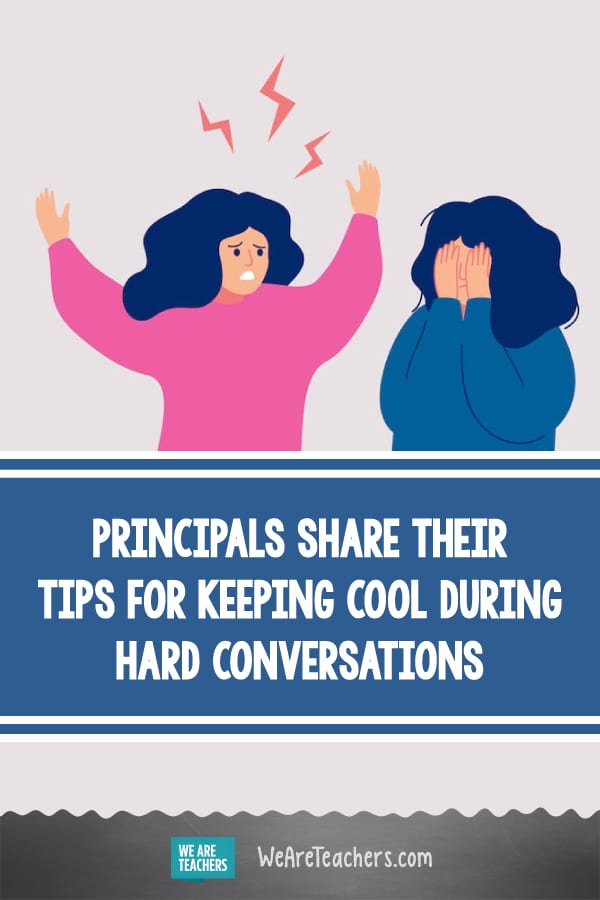From challenging parenting interactions and difficult discussions with teachers and students, hard conversations are part of a principal’s job. School leaders are always working on mastering the art of keeping their cool and their emotions in check. Recently in our Principal Life Facebook Group, someone asked, “how do you keep your emotions in check when having critical conversations?” Responses quickly poured in, and there were so many helpful tips and suggestions that we just had to share. No matter how level-headed you are, this year we are all feeling anxious, exhausted, and emotional. While we all know it is better to respond than react, it’s easier said than done. Here’s how principals keep their cool, no matter how hard the conversation is.
“I always remember that my responsibility is to do what’s right for the kids and what works for the adults.” —Michael
When you’re having a conversation with a teacher or parent, it’s often about their student or child. We love Michael’s advice because we need to keep everyone in mind, and not everyone has the same needs.
“I always try to look for the underlying commonality.” —Kourtney
This is such an important reminder. Whether you are talking to a parent, a child, or a teacher, you are all on the same team. Everyone wants the kids to be healthy and successful. If the conversation gets heated or someone is defensive, you can circle back to this common goal and diffuse the situation before the conversation continues.
“I script my thoughts out in the form of a follow-up email.” —Lindsay
This was the most popular suggestion. So many principals shared that it’s worth the time and energy to thoughtfully chart out what you plan to say. We love Lindsay’s idea to write it out in the form of a follow-up email. She makes edits to the email based on how the conversation goes and only has to hit send after she’s had time to process.
[contextly_auto_sidebar]
“I practice what I’m going to say on the car ride to school.” —Emma
There’s something about saying things out loud that helps us feel more confident and prepared. Plus, you can work out any emotions that come up before the conversation even takes place. Don’t want to talk to yourself? Corynn suggests practicing (without using names) with a trusted colleague or friend. Need some privacy? Mike practices in front of the mirror, which allows him to check his body language and facial expressions.
“We establish ground rules. I suggest mine, and then ask if they agree and have any to add.” —Kim
One way to prevent a conversation from getting heated and losing your cool is to ask the other person what they need to be able to have the conversation in the first place. This is called creating a “safe container” (thanks, Brene Brown!).
“I ask open-ended questions.” —Jessica
Many principals shared that hard conversations are more productive when they approach the conversation with curiosity and give the other person a chance to give their perspective. Some popular question starters were:
- How do you see it?
- Can you build my understanding?
- I think what I hear you saying …
“It helps to have a cup of tea or coffee in my hand to take a sip in the moment.” —Nikki
Do you talk a lot when you are nervous? Or maybe it’s hard for you to listen without jumping in? Nikki’s strategy is so good for these reasons. She shares that pausing and taking a sip keeps her from responding right away. It helps her remember to listen and not dominate the conversation. Similar to taking a deep breath, if you feel yourself starting to get emotional, the warm drink can help you recenter.
“It’s OK to take a break or even reschedule.” —Jennifer
If the conversation isn’t going anywhere and emotions are running high, Jennifer reminds us that it’s OK to take a break and reschedule. She suggests saying, “It seems like we might need to take a break and discuss this when we are a bit calmer. When is a good time?” Chantelle stresses the importance of simply being quiet when the conversation starts to get heated. She says, “Never underestimate the power that listening and pauses can have in deescalating a person in a hard conversation.”
“I send a follow-up email recapping what was said.” —Corynn
So many principals in the group shared that it is important that everyone leaves the conversation with a next step, even if that next step is to reflect or think things over and then meet again. We loved Corynn’s suggestion to not just follow up but also ask the other person if there was anything they’d like to add or that you missed. She suggests sharing what you plan to do and also ask the other person what they will do next.
“Schedule something that brings you joy after.” —David
Even after a tough conversation, the day and the work must go on. David’s suggestion is a good reminder to flip the script and get yourself in a better headspace by doing something that makes you happy. He suggests a teacher observation, student meeting, or discussing a new project. It helps remind him that hard conversations are just part of the work that we get to do.
Sometimes getting emotional is OK.
We are all professionals here, but leading during a pandemic has us under more stress than we knew possible. The challenging conversations we’re having are made even more difficult due to COVID-19. Kris reminds us that we are all human, and sometimes it’s impossible to hold back your emotions. For her, this resulted in her crying on screen as she told her teachers that she had their backs. After parents and community members were bashing teachers on social media, she needed teachers to know that she was there for them.
What are your tips for principals having hard conversations? Come share in our Principal Life Facebook Group.
Plus, A Guide to Courageous Conversations for Principals


